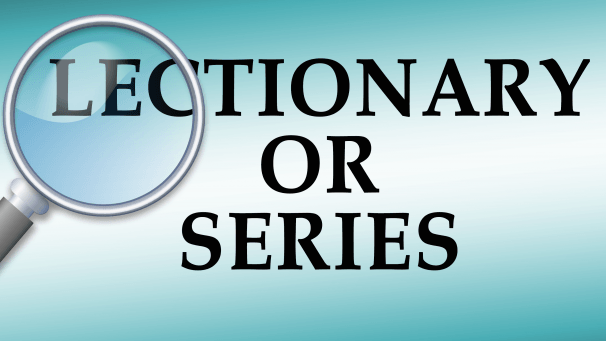Lectionary or Series?
by Dr. Alyce M. McKenzie on Thursday, November 10, 2016

Whenever I lead a preaching workshop, during the Q and A, the question almost always comes up: Which is better, lectionary preaching or series preaching? My answer is that both have advantages and potential pitfalls. Let’s take lectionary preaching first.
Lectionary Preaching
The Revised Common Lectionary website points to the following advantages to preaching the lectionary http://www.commontexts.org/rcl/
- A lectionary provides whole churches or denominations with a uniform and common pattern of biblical proclamation.
- A lectionary provides a guide and resource for clergy from different local churches who wish to work and pray together as they share their resources and insights while preparing for their preaching.
- A lectionary provides a guide to individuals and groups who wish to read, study, and pray the Bible in tune with the church’s prayer and preaching.
- A lectionary also shows us the relationship of the readings of one Sunday with those that come before it and after it. Within each of the major seasons of Lent, Easter, Advent, and Christmas-Epiphany, the flow and missional purpose of the season is reflected in the Scripture texts selected for each Sunday.
The advantage of lectionary preaching for me is that it prevents my preaching on my five favorite go to texts 52 weeks out of the year. An obvious disadvantage to the lectionary is that the Bible is too big for its confines. Does the preacher ever get to preach from the texts it leaves out? Or the verses that are left out of the particular passages for that day that would help to understand their broader context?
In times of crisis, the lectionary texts of the day may seem disconnected from real world events, though, in my experience this has not been the case. More often lectionary readings have had an uncanny connection to contemporary crises and events that I would not otherwise have discerned.
Series Preaching
As for series preaching, it is all the rage these days. Series have the advantages of continuity and a chance to explore a particular topic over several weeks. These are significant advantages. Series work best when they mirror the qualities of effective sermons my colleague O. Wesley Allen outlines in his book Determining the Form.
Unity of theme
Proportion (spending the most time and energy on what is most important),
Movement- a forward moving momentum from week to week that invites people along on an intriguing and satisfying journey.
The disadvantage of series is not inherent in the concept of a series, but in its poor execution.
These include:
A series whose theme is diffuse, weak or trivial. This is often caused by allowing the cultural tail to way the biblical dog. It is crucial that we engage contemporary concerns and existential themes. But our understanding of Scripture and its theological implications should always be in the driver’s seat of a series. Otherwise we are offering self-help frosted with Scripture, nothing a listener can’t get from multiple cultural venues. Our job is to offer good news, not good advice.
A series that spends too much time on window dressing and not enough on substance (too many condiments and no entrée).
A series that does not build interest from week to week and end on a compelling note.
I call this “the piling people into the church van and driving them around the parking lot for 6 weeks and dropping them off at the church door” series.
Augustine back in the 400’s taught preachers that a sermon should teach, delight and persuade. By teach, he meant, offer fresh insights from an in-depth study of Scripture. By delight, he didn’t mean just entertain, but engage listeners at the deepest level of human interest, pain and joy.
Series can fail for the same two reasons an individual sermon can fail. They don’t teach Scripture or engage the human condition with enough depth. They may offer surficial entertainment, but don’t always delight, bring joy to the soul.
In my view, when series go awry, the trouble isn’t with the genre of sermon series itself, but with the depth of the preacher’s biblical and theological understanding. It’s worth asking ourselves: Do we know our Bible and our tradition well enough to preach series that are both profoundly biblical and profoundly relevant?
When series go awry, the trouble may also be with the depth of the preacher’s understanding of her congregation in its historical, social, pastoral context. It’s worth asking ourselves: Do we know our congregation in its social context well enough to preach a series that speaks to the depths and heights of their personal and social experience?
In preaching, we are always on the journey and never arrive. This frustrates some and energizes others. Lectionary or series- either way, let our sermons be the products of preachers who are lifelong students of Scripture, their theological traditions, and human experience. Our people deserve no less.
***

Dr. Alyce M. McKenzie
Le Van Professor of Preaching and Worship
Altshuler Distinguished Teaching Professor
Director, The Perkins Center for Preaching Excellence
